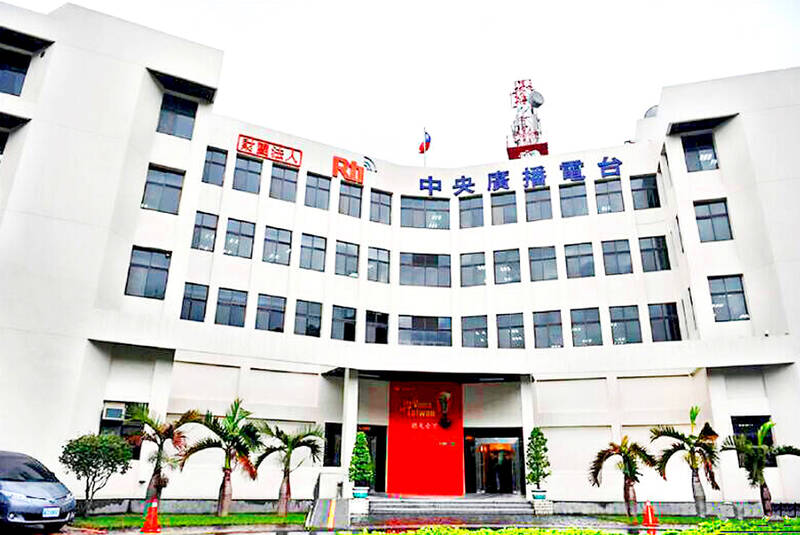Documents Taiwan People’s Party Chairman Huang Kuo-chang (黃國昌) has requested from Radio Taiwan International (RTI) constitute a potential threat to the security of critical national infrastructure, potentially providing comprehensive reference material for planning attacks, a security official said yesterday.
Information related to RTI’s broadcasting station in Yunlin County’s Baojhong Township (褒忠) is considered highly sensitive, said the official, who declined to be named.
The station is designated as a backup facility for the Executive Yuan to broadcast to the international community if RTI’s headquarters in Taipei is disabled during a conflict, they said, adding that due to its proximity to China and the coast, the station is one of the few RTI facilities guarded by the Second Special Police Corps.

Photo: Taipei Times
The Mirror Daily Web site on Friday reported that Huang’s office in late August requested detailed content about the station’s relocation and consolidation plan, as well as copies of all its transmitting antenna licenses and operational data, including power consumption records, for its transmitters dating back to 2016.
His office made the request citing a Mirror Media report published four years ago that claimed the radio service misused subsidies and fire equipment, the new article said.
Huang’s request went significantly beyond what is needed for investigating irregularities or administrative review, the security official said.
An analysis by security agencies of the documents requested suggested the information constituted a potential threat to the security of critical national infrastructure, they said.
Access to electricity bills could reveal site locations, feeder line codes and power capacity, allowing inference of power line locations and broadcast signal scale, while temperature records could reveal operation times and frequencies, and antenna angles could pinpoint broadcast coverage and target areas.
Technical data such as voltage, current and power could expose equipment capabilities and operational status, they said, adding that such leaks could compromise the station’s security.
Vacuum tube operational hours could indicate system runtime and frequency, and staff duty logs could expose security personnel numbers, shift patterns and rotations, the official said.
The long-term and detailed operational details are unrelated to “procurement oversight” or “investigating irregularities,” and yet the data could form a comprehensive blueprint for anyone intending to sabotage critical infrastructure, they said.
Huang yesterday said that the documents provided by RTI were not marked as classified and that the agency never indicated the information was sensitive during the request process.
That the information was not classified showed that Mirror Daily’s report about him requesting classified information was “fake news” and a “malicious smear,” he said.
He said the media outlet was attempting to label him as pro-China.
“The degree of moral degeneration is heartbreaking,” he said.
National Cheng Kung University political science professor Hung Ching-fu (洪敬富) said that government agencies should maintain a clear boundary when responding to elected representatives’ data requests.
Laws such as the Anti-Infiltration Act (反滲透法) or National Security Act (國家安全法) should better define whether information on critical infrastructure can be provided for legislative inquiries and how to balance such requests with national security, he said, citing Beijing’s increasing infiltration and “united front” efforts.
National security is paramount, he said, data provision should come with strict confidentiality clauses.
Additional reporting by Liu Wan-lin

A small number of Taiwanese this year lost their citizenship rights after traveling in China and obtaining a one-time Chinese passport to cross the border into Russia, a source said today. The people signed up through Chinese travel agencies for tours of neighboring Russia with companies claiming they could obtain Russian visas and fast-track border clearance, the source said on condition of anonymity. The travelers were actually issued one-time-use Chinese passports, they said. Taiwanese are prohibited from holding a Chinese passport or household registration. If found to have a Chinese ID, they may lose their resident status under Article 9-1

Taiwanese were praised for their composure after a video filmed by Taiwanese tourists capturing the moment a magnitude 7.5 earthquake struck Japan’s Aomori Prefecture went viral on social media. The video shows a hotel room shaking violently amid Monday’s quake, with objects falling to the ground. Two Taiwanese began filming with their mobile phones, while two others held the sides of a TV to prevent it from falling. When the shaking stopped, the pair calmly took down the TV and laid it flat on a tatami mat, the video shows. The video also captured the group talking about the safety of their companions bathing

A classified Pentagon-produced, multiyear assessment — the Overmatch brief — highlighted unreported Chinese capabilities to destroy US military assets and identified US supply chain choke points, painting a disturbing picture of waning US military might, a New York Times editorial published on Monday said. US Secretary of Defense Pete Hegseth’s comments in November last year that “we lose every time” in Pentagon-conducted war games pitting the US against China further highlighted the uncertainty about the US’ capability to intervene in the event of a Chinese invasion of Taiwan. “It shows the Pentagon’s overreliance on expensive, vulnerable weapons as adversaries field cheap, technologically

Starting on Jan. 1, YouBike riders must have insurance to use the service, and a six-month trial of NT$5 coupons under certain conditions would be implemented to balance bike shortages, a joint statement from transportation departments across Taipei, New Taipei City and Taoyuan announced yesterday. The rental bike system operator said that coupons would be offered to riders to rent bikes from full stations, for riders who take out an electric-assisted bike from a full station, and for riders who return a bike to an empty station. All riders with YouBike accounts are automatically eligible for the program, and each membership account